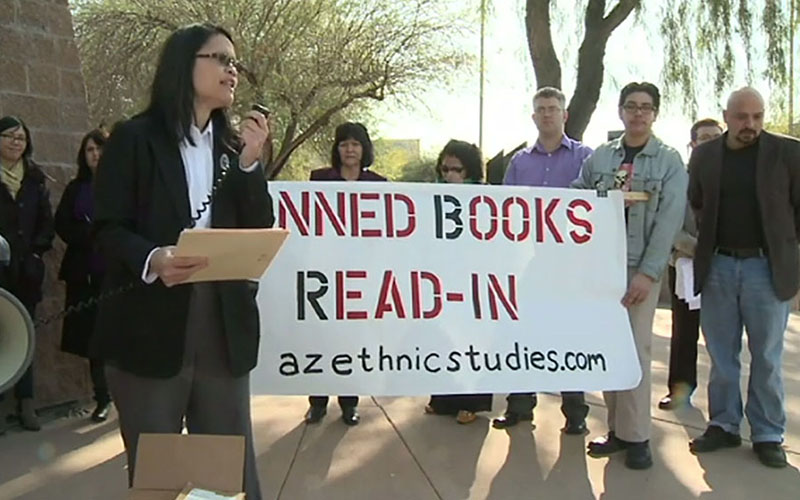
Tucson Unified School District teachers and students gathered in 2012 to protest against Arizona House Bill 2281, which was aimed at eliminating the school district’s Mexican American Studies program. (Photo by Lesley Marin)
WASHINGTON – A federal appeals court on Tuesday ordered a new hearing to determine whether a law banning the Tucson school district’s Mexican American Studies program was motivated by an intent to discriminate against minority students.
The ruling by a three-judge panel of the 9th U.S. Circuit Court of Appeals reversed a lower court ruling that upheld HB 2281, the state law championed by former Attorney General Tom Horne and former state school Superintendent John Huppenthal that targeted the program.
The appeals court said the lower court wrongly granted summary judgment for the state, denying the students and teachers who sued to block the law a chance to present evidence that it violated their 14th Amendment right to equal protection.
Attorneys for the students could not be reached for comment Tuesday and an official with the Tucson Unified School District said the district would not have a comment on the ruling.
But current state schools Superintendent Diane Douglas said she “strongly supports” the law and will continue to adhere to its principles.
“I will continue to move forward with my plan that all children in Arizona receive an inclusive educational experience that recognizes the greatness and the trials experienced by all ethnicities,” Douglas said in a statement released by her office.
The case centers on HB 2281, a 2010 law that prohibited classes that promote the overthrow of the government, promote “resentment toward a race or class of people,” are designed primarily for a “particular ethnic group” and “advocate ethnic solidarity instead of the treatment of pupils as individuals.”
After state officials determined that the Mexican American Studies program met those criteria – and threatened to withhold 10 percent of the school district’s funds – the Tucson Unified School District ended the program.
A group of teachers and students sued, claiming the law violated their First Amendment free speech right and their 14th Amendment rights, among others.
But in March 2013, a district court rejected most of those claims and let the law stand, granting summary judgment in favor of the state.
The appellate court panel agreed Tuesday with the lower court that the law was not discriminatory on its face, since its intent was to prohibit courses that promoted racism.
But the court said there is a “genuine issue of fact as to whether the statute was enacted and/or enforced with discriminatory intent.”
The court pointed to statements by lawmakers during hearings on the bill that the Mexican American Studies program was creating “racial warfare” and the program’s supporters included groups that said “North America is a land for the bronze peoples.”
While the the legislative history behind the bill “contains only a few snippets of overtly discriminatory expression,” said the opinion written by Judge Jed S. Rakoff, it is enough to “reasonably suggest an intent to discriminate.”
The court ordered a new hearing at the district court on whether discriminatory intent existed in the passage of the law.
In a partial dissent, Judge Richard R. Clifton said he concurred with the majority’s decision to send the issue back to the lower court.
But Clifton said he did not agree that the plaintiffs had presented sufficient evidence “to raise a genuine dispute as to whether the enactment and/or enforcement of the statute ‘was motivated, at least in part, by an intent to discriminate against MAS students on the basis of their race or national origin.'”
For her part, Douglas said a program that holds “a color palette to a child’s skin to determine which instruction they should receive is abhorrent in our society.”
“My goal is that the next generation will find such laws and court trials archaic because Arizona school children will learn of everyone’s rich heritage and we will teach appreciation, not discrimination in our schools,” her statement said.